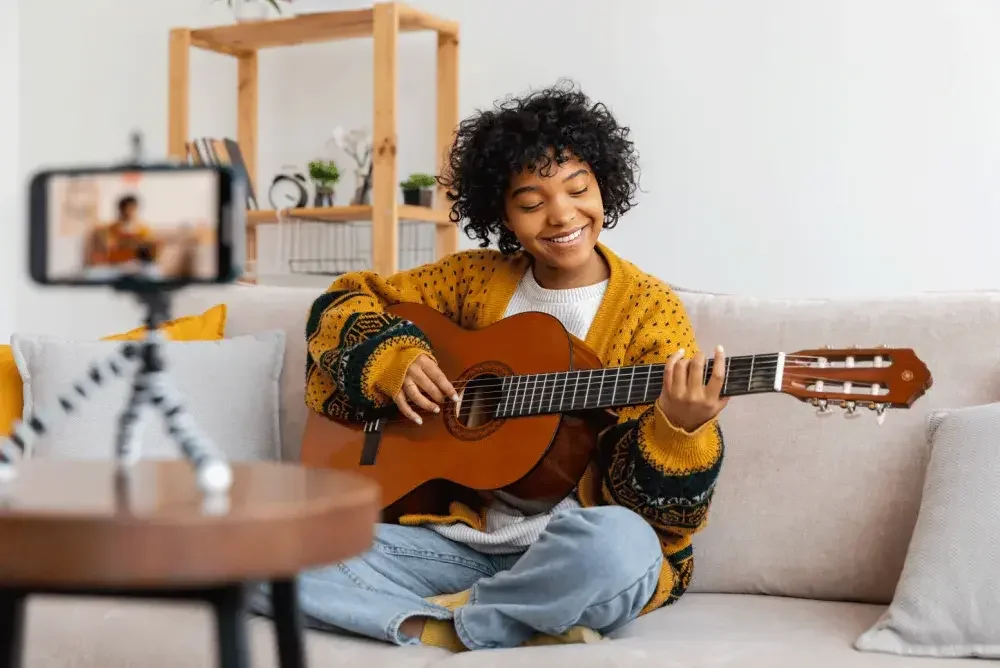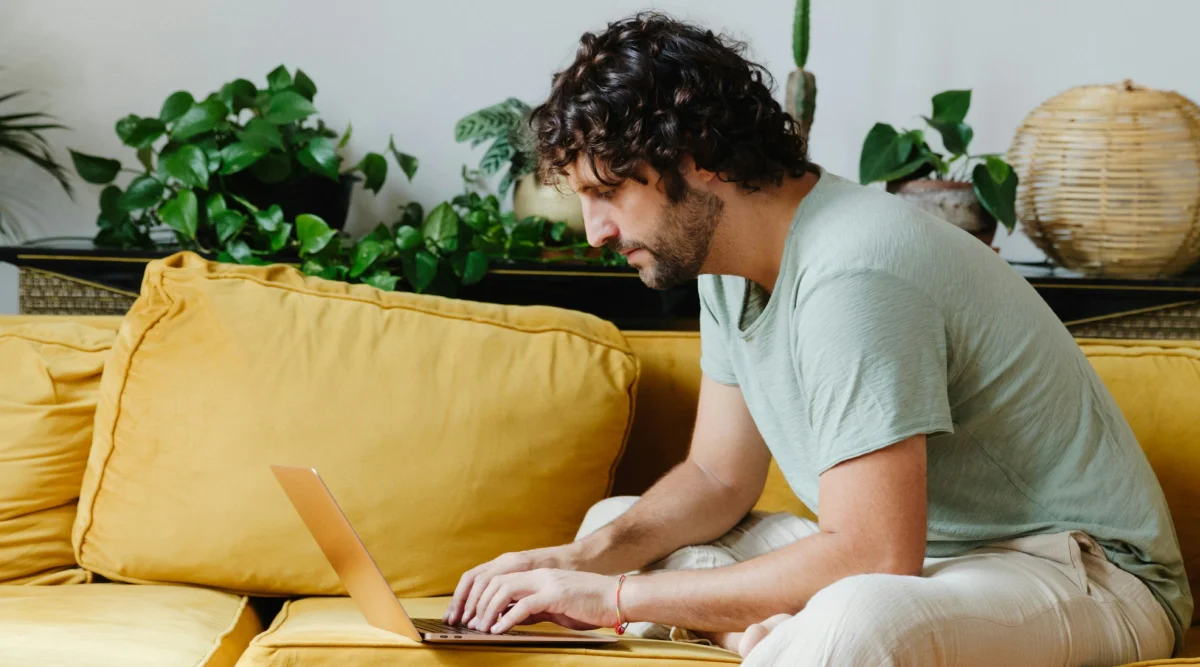If you're a musician growing your audience, you've probably considered posting cover songs on YouTube. YouTube cover songs are a great way for unknown or indie artists in the music business to pique fans' interest and can help grow a channel. But there are also pitfalls.
Creators need to take steps to avoid getting into legal trouble for making a cover song or cover video, and being aware of basic tenets of intellectual property law will go a long way toward protecting you. Here's what you need to know about posting cover songs on YouTube.

What are cover songs?
A cover song or cover version is a musician's personal interpretation of a song composed by another artist.
Some musical acts may choose to play someone else's song strictly as it is known popularly by the original artist. Others may choose to change the original version by adding their own touch or making a music video of a cover song. This is a great way for a band to expand its audience internationally without having to go on a world tour.
According to the U.S. Copyright Office, you can use music that falls into one of two categories:
- Music within the public domain.
- Music you've been granted permission to use from the copyright owner directly.
How do you legally post cover songs on YouTube?
There are a number of misunderstandings surrounding the use of YouTube covers. Here are some rules you must follow to upload a YouTube cover song:
- All artists must seek permission to post a cover song not in the public domain on their YouTube channel.
- The artist must define all intended uses and compare them with the exclusive rights of the copyright in order to ensure that the song is being used legally.
- Attempting to make contact with the rights holder does not mean legal permission is automatically granted.
According to YouTube's copyright policy, creators are prohibited from using content, such as a a cover song video, that someone else owns the copyright to without permission.
Cover song licensing
There are several steps you must take to ensure that you're using a cover song legally when posting cover songs on YouTube.
1. Consult an intellectual property law attorney
An intellectual property law attorney, or IP attorney, works to help artists and creators protect their intellectual property.
While there are many kinds of intellectual property, in this instance, we are talking about copyrighted material, which can include literary works, dramatic pieces, musicals, artistic creations, poetry, novels, movies, and songs.
An IP attorney can advise a client on the legal rights involved with protecting intellectual property, represent clients in the courtroom, offer support with understanding legal documents, and more.
2. Locate the copyright owner
U.S. law protects the rights of the song owner to record, publicly perform, and distribute a song. An IP attorney can help an artist find the copyright holder of a song before releasing a cover. These public listings of copyright owners can be found using resources from BMI, ASCAP, and the U.S. Copyright Office.
3. Contact the copyright owner
The IP attorney should send a notice of intention to the owner of the song at least 30 days before recording and public release. The letter must detail how the cover artist intends to use the cover song.
If it is difficult to find the owner of the copyright, the IP attorney can send a letter to the U.S. Copyright Office detailing that the copyright holder's address is unknown.
4. Pay royalty fees
The artist must pay a fee to purchase a necessary mechanical license for the legal use of the song, which you can get from the Harry Fox Agency.
A mechanical license is required by U.S. copyright law for those who want to create and distribute recordings of an original composition written by someone other than the artist creating the cover song.
However, in order to use the song in a video, the artist must pay statutory mechanical royalties for each use of the song based on rates determined by the Copyright Royalty Board.
The mechanical license only covers the audio portion of your YouTube cover.
To post video along with the song, you'll need a synchronization license, also called a “sync" license. You must negotiate a sync license (sometimes spelled synch license) with the song's copyright holder. While copyright owners must grant mechanical licenses, they are not required to give you a sync license, nor is there a set fee for the license.
According to YouTube's copyright policy, creators are prohibited from using content, such as a cover song, that someone else owns the copyright to without permission.
What happens when you post a cover song without permission?
If an artist chooses to ignore the copyright laws set forth by YouTube and the U.S. Copyright Office, there may be several consequences.
Demonetization of content
A copyright infringement claim on YouTube usually leads to the demonetization of content. Should the copyright holder find out the artist is using their song without legal permission, they can choose to monetize the video themselves and receive all royalties.
Muting the content
The copyright owner can choose to mute the content, meaning that the video will be available for viewing, but there will be no sound. This can lead to viewers disengaging from the content, and a drop in viewer count.
Blocking the content
The copyright holder can choose to block the content, making the video unavailable. If the artist receives three copyright strikes, there is a chance that the entire channel can be taken down.
Final tips on avoiding copyright claims on YouTube
It is important to note that placing a disclaimer in the YouTube video's description is not a replacement for obtaining proper permission to utilize a song.
Here is what an artist can do instead to avoid copyright claims on their YouTube videos.
Use your original songs and content: Using your own songs, original music, or royalty-free music is the only way to ensure that the original artist does not obtain copyright strikes on their channel. You can use royalty-free music as a backdrop to your own lyrics and video content.
Fair use laws do not apply to cover songs. Although an artist's very own version of a song may be different from the original track, it does not mean that the song can be used in a YouTube video without proper permission.
If your YouTube channel has problems using a cover song, there is an official process to resolve a copyright claim.
FAQ: Posting YouTube cover songs
Can cover songs be monetized on YouTube?
According to YouTube, eligible cover songs can be monetized on a pro rata basis provided the creator of the original song is a participant in the YouTube Partner Program.
Can I cover a song without permission?
If a sound recording of the song is not in the public domain, then the artist must seek permission to use it on their YouTube channel, or they may face a copyright claim.
Can I use album covers on YouTube?
If the album cover is copyright-protected, then the creator must obtain permission to use it from the record label or copyright holder. YouTube does not grant permission to use copyrighted material.
What other songs are you allowed to cover?
A creator can cover any song published in the public domain. Otherwise, you must obtain a license.
Copyright law and YouTube
YouTube is a great tool for offering unknown artists exposure to local and global audiences. However, it is up to the artist to do their due diligence when it comes to protecting their art and the creations of others.
Understanding copyright law and obtaining proper licenses is important to ensure that you can create and share your work without suffering legal consequences.
Why choose LegalZoom?
It's easy to get the right protection. LegalZoom can help you register a trademark, search the federal database to avoid infringement, file a statement of use, and monitor activity.
Freelance writer Jane Haskins, Esq., contributed to this article.

